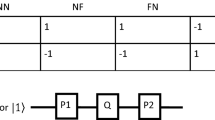Abstract
Quantum computation has grown into a successful field of research during the last few decades. Parallelly the field of game theory has also evolved, resulting in the pursuit of quantum game theory. Works on this interdisciplinary field from early researchers like David A. Meyer, J. Eisert, M. Wilkens, A. Iqbal, E. Piotrowski, J. Orlin Grabbe, Adrian P. Flitney, and Derek Abbott are highly recommended. This article presents an introductory review of studies on understanding the workflow of quantum game-theoretic models along with their computer simulations. It starts with an introduction to game theory and quantum computation, followed by theoretical analyses of the classical and quantum versions of three game theory models—the penny flip game, prisoner’s dilemma, and the two-person duel, supported by their simulation results. The simulations are carried out by writing Python codes that help us analyze the models. We will be able to understand the differences in the behaviors of both versions of the game models from the analyses.
Similar content being viewed by others
Suggested Reading
David A. Meyer, Quantum strategies, Phys. Rev. Lett., Vol.82, pp.1052–1055, Feb 1999.
Jens Eisert and Martin Wilkens, Quantum games, Journal of Modern Optics, Vol.47, 14–15, pp.2543–2556, 2000.
J Orlin Grabbe, An introduction to quantum game theory, arXiv preprint quant-ph/0506219, 2005.
A Iqbal and A H Toor, Evolutionarily stable strategies in quantum games, Physics Letters A, Vol.280, Nos.5–6, pp.249–256, 2001.
J Maynard Smith and George R Price, The logic of animal conflict, Nature, Vol.246, No.5427, pp.15–18, 1973.
Edward W Piotrowski and J Sładkowski, Quantum market games, Physica A: Statistical Mechanics and its Applications, Vol.312, Nos.1–2, pp.208–216, 2002.
Edward W Piotrowski and Jan Sładkowski, Quantum-like approach to financial risk: Quantum anthropic principle, arXiv preprint quant-ph/0110046, 2001.
Indranil Ghosh, indrag49/quantum-game-theory: Python program written to run simulations on quantum game theory models, https://github.com/indrag49/Quantum-Game-Theory, 2020. (Accessed on 05/02/2020).
Indranil Ghosh, indrag49/quantum-game-theory: Python program written to run simulations on quantum game theory models, https://github.com/indrag49/Quantum-Game-Theory, 2020. (Accessed on 05/02/2020).
John Von Neumann and Oscar Morgenstern, Theory of Games and Economic Behavior, Princeton University Press, 1944.
John F Nash et al., Equilibrium points in n-person games, Proceedings of the National Academy of Sciences, Vol.36, No.1, pp.48–19, 1950.
John Nash, Non-cooperative games, Annals of Mathematics, pp.286–295, 1951.
Giacomo Bonanno, Game Theory (open access textbook with 165 solved exercises), 2015.
Steven Tadelis, Game Theory: An Introduction, Number 10001 in Economics Books, Princeton University Press, 2012.
Michael A Nielsen and Isaac L Chuang, Quantum computation and quantum information, Phys. Today, Vol.54, 60–2, 2001.
N David Mermin, Quantum Computer Science: An Introduction, Cambridge University Press, 2007.
Paul Benioff, The computer as a physical system: A microscopic quantum mechanical hamiltonian model of computers as represented by Turing machines, Journal of Statistical Physics, Vol.22, No.5, pp.563–591, 1980.
Richard P Feynman, Simulating physics with computers, Int. J. Theor. Phys., Vol.21, (6/7), 1999.
D Deutsch and R Jozsa, Rapid solutions of problems by quantum parallelism, Proc.r. In Soc. Lond. A., Vol.439, pp.553–558, 1992.
Peter W Shor, Algorithms for quantum computation: Discrete logarithms and factoring, Proceedings 35th Annual Symposium on Foundations of Computer Science, pp.124–134, Ieee, 1994.
Lov K Grover, A fast quantum mechanical algorithm for database search, In Proceedings of the Twenty-eighth Annual ACM Symposium on Theory of Computing, pp.212–219, 1996.
Aram W Harrow, Avinatan Hassidim and Seth Lloyd, Quantum algorithm for linear systems of equations, Physical Review Letters, Vol.103, No.15, p.150502, 2009.
Seth Lloyd and Samuel L Braunstein, Quantum computation over continuous variables, Quantum Information with Continuous Variables, pp.9–17, Springer, 1999.
Edward Farhi, Jeffrey Goldstone, Sam Gutmann and Michael Sipser, Quantum computation by adiabatic evolution, arXiv preprint quant-ph/0001106, 2000.
John Watrous, On one-dimensional quantum cellular automata, In Proceedings of IEEE 36th Annual Foundations of Computer Science, pp.528–537, IEEE, 1995.
Paul Adrien Maurice Dirac, A new notation for quantum mechanics, In Mathematical Proceedings of the Cambridge Philosophical Society, Vol.35, pp.416–418, Cambridge University Press, 1939.
Albert Einstein, Boris Podolsky and Nathan Rosen, Can quantum-mechanical description of physical reality be considered complete? Physical Review, Vol.47, No.10, 777, 1935.
Erwin Schrödinger, Discussion of probability relations between separated systems, In Mathematical Proceedings of the Cambridge Philosophical Society, Vol.31, pp.555–563, Cambridge University Press, 1935.
Jun John Sakurai and Eugene D Commins, Modern Quantum Mechanics, revised edition, 1995.
Author information
Authors and Affiliations
Corresponding author
Additional information
Indranil Ghosh is a graduate student doing post graduation in physics specialising in condensed matter physics, from the Department of Physics, Jadavpur University, Kolkata. His research interests include computational physics, numerical computing, quantum mechanics and quantum computing.
Rights and permissions
About this article
Cite this article
Ghosh, I. Quantum Game Theory — I. Reson 26, 671–684 (2021). https://doi.org/10.1007/s12045-021-1168-2
Published:
Issue Date:
DOI: https://doi.org/10.1007/s12045-021-1168-2




